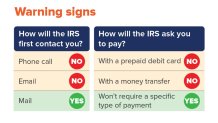This week is dubbed Tax Identity Theft Awareness Week by the Federal Trade Commission.
With the tax deadline looming on April 15, now is the time to take steps to protect yourself and your money.
Financial professional Steve Ringo from Dewitt & Dunn Financial Services said scammers are on the move to prey upon consumers.
"Most people are using online technology we have available today to register or fill out information -- whether it's for taxes or any other purpose -- so tax scammers are able to get in and utilize your information," he said.
Dewitt listed out the following tips to protect yourself this tax season:
File as Early as Possible
Late March and early April are when tax scammers tend to spend more time looking to steal personal information. Filing as soon as you get all of the necessary paperwork will be your best defense against tax identity theft.
“Another thing to note is that the IRS only excepts returns from one Social Security number, so if you can go ahead and get that taken care of as soon as possible you’ll be able to avoid that risk of somebody getting your personal information," said Ringo.
Local
The latest news from around North Texas.
You can find out if your identity has been compromised by checking your credit report. If you notice something suspicious, this could be a sign a scammer has your Social Security number.
Protect Your Computer
If you're filing taxes online, make sure you have security software with firewall and anti-virus protections. Do not use public wi-fi; instead use a private, password-protected connection.
If you're getting rid of an old computer, either destroy the old appliance or wipe all applications clean to delete the data.
A strong password is key to protecting yourself. Be sure to create a password with at least eight characters, including numbers, symbols and both uppercase and lowercase letters.
Beware of Scams
A new tax-related scam to be on the lookout for comes from a caller claiming your Social Security number will be suspended or canceled.
Remember, the IRS will initially contact you by sending a letter in the mail. After receiving a written notice, you may receive a phone call to discuss your situation or confirm a visit from an IRS employee. The IRS will never email you, send a text or contact you on social media.

Always be suspicious of official-looking emails that seem to come from the IRS or your bank. Check the email address that's sending the information and don't click on any links.
Adjust Your Withholding
Ringo said adjusting your withholding to lower your refund is another way to protect your money and your identity.
Ideally, you want to have just enough withheld so your refund is as close to 0 as possible.
"Not only does it protect your money, but you get more money in your paycheck year-round," said Ringo. "Take the extra money throughout the year and put it into a savings account or invest it."
Thanks to the new tax law, many of us are withholding the wrong amount from our paychecks.
If you become a victim of tax identity theft, the first step is to contact the IRS as soon as possible. Ringo said to document everything and keep in contact with the IRS until the issue is resolved.
You can file an identity theft complaint with the Federal Trade Commission (FTC).
You may also want to file a report with the local police, as well as contact the fraud departments of the three major credit bureaus.
If you need to file a any type of complaint, you can contact the Treasury Inspector General for Tax Administration (TIGTA) at tigta.gov or 800-366-4484.
You can also file complaints through the FTC at ftc.gov/complaint or 877-FTC-HELP.
Click here for the IRS' Taxpayer Guide to Identity Theft for more resources on where to start and who to call if you think you are a victim to a scammer.



